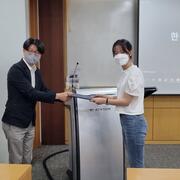
This summer, owing to the support of the Korea Institute, I participated in the intensive 6-week advanced academic Korean language program at the Inter-University Center for Korean Language Studies at Sungkyunkwan University (SKKU). I greatly appreciate the opportunity to take part in the program which is essentially the only Korean language program that is specifically designed to train foreign researchers and professionals in Korean studies in the use of high-level, academic Korean.
The program was particularly useful as it allowed me to broaden and deepen the scope of my master’s thesis research – dealing with wartime tourism in colonial Korea (1937-1945) - by reading secondary sources in Korean as well as learning to articulate my ideas in Korean in weekly presentations. Through weekly reading sessions conducted one-on-one with IUC professors, I spent my time closely reading two academic articles in the Korean language pertaining to my thesis topic. Summarizing and organizing the content of these readings in relation to my own primary-source based research, I produced a power point and script entirely in Korean every week to present in front of my peers. These recurring sessions of input and output in academic Korean ultimately culminated in the final presentation, which I presented on the topic: “Politics of Representation: Tourism Korea and Culture in Wartime Colonial Korea (1939-1945).” Summarizing my research over the weeks, I examined representations of women and “northern Korea (buksǒn)” in the wartime magazine, Tourism Korea, and discussed colonial tourism as a cultural strategy of the wartime Japanese empire to integrate Japan and Korea. The full-rounded process of reading, summarizing, writing, and finally conveying my research to a professional audience in the Korean language not only improved my Korean language skills to the academic level, but it also helped me greatly in thinking more clearly about my thesis research in ways that I could not have done in English or Japanese.
A most memorable moment in the program was the opportunity to partake in a special lecture by Professor Shin Hyerin of Korea University. The IUC program allows students to request professors in Korea - working in fields or topics aligned with their own research interests - to visit the program and present on a topic of their interest. Very fortunately, my request to invite Professor Shin to the program was realized, and Professor Shin gave a special lecture on the topic: “The Aesthetics of Decolonial Identities: Gender and Nationality in South Korean Media Portrayals in the Colonial Era.” She primarily discussed issues surrounding representations of gender and race in popular Korean media especially dealing with Korea’s colonial experience such as the film, The Housemaid (2016), and the novel as well as television series, Pachinko. The opportunity to be able to personally request a renowned professor in Korea and listen to a lecture especially catered to my research interests was truly valuable. Moreover, to be able to partake in a lecture conducted entirely in Korean for an academic audience was a highly intellectually stimulating experience: I learned immensely from the comments and responses given by my peers as well as from regular students at Sungkyunkwan University who were also present at the special lecture.
Through the IUC curriculum, I was also able to gain insight into the linguistic structure and historical, cultural, ideological background of the Korean language. In classes on Classical Chinese texts and characters (Hanmun/Hanja) we read excerpts from classical Daoist texts by Zhuang Zi which directly fed into my understanding of contemporary Korean vocabulary, a lot of which are derived from sinographs. I found this particularly interesting because, for the first time, I was able to personally recognize and experience the significant differences between Korean and Japanese writing, rather than their oft-emphasized similarities. I was fascinated with the ways of thinking historically and culturally embedded in Korean literary expressions, which I was able to further explore in classes dedicated to the reading of Korean literature including contemporary short stories by writers Kim Aeran and Kim Geumhee.
I would like to extend my best thanks to my professors in the IUC program who instructed us with the utmost passion and spent nights revising our presentations, as well as my peers, whose enthusiasm towards their research in various fields and disciplines was a constant source of inspiration. Above all, I would like to express my greatest gratitude to the Korea Institute for providing a generous grant and supporting my studies at IUC this summer, which I can say with great confidence was one of the most fruitful and meaningful summers both in terms of my academic and personal growth.